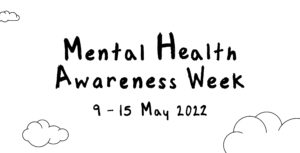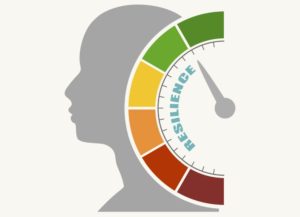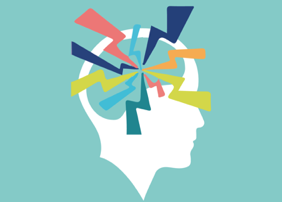Mental Health Awareness Week 2022
Looking after your mental health in uncertain times can help to manage stress and anxiety
In our lives we all experience periods of uncertainty. We have had a lot to deal with over the last couple of years with the Covid pandemic, enforced isolation and now uncertainty in Europe with Russia’s invasion of the Ukraine. These things are out of our control which can feel overwhelming, but there is a lot we can do to control our mental response to these uncertainties.
As part of Mental Health Awareness week 9 - 15 May we held a webinar on 'Looking After Your Mental Health in Uncertain Times' on Thursday 12 May at 14:00.
Watch the video of our webinar below and read the information from Dr Susan Brennan on how you can help manage your mental health.
Stress and Anxiety
Uncertainty can bring about feelings of unease and worry and anxiety can often stem from the unknown. By understanding anxiety and how it works, there are many things we can do to stay calm.
A small amount of stress can be helpful in our lives. You’ll most likely have heard of the ‘fight-or-flight’ survival response that stress can cause. This helps us act quickly when we’re feeling under pressure. However, experiencing stress over a prolonged period, known as chronic stress, can have a negative impact on both physical and mental wellbeing and can lead to anxiety. This is why it’s important to make your mental health a priority through continued uncertainty.
Looking after your emotional wellbeing
There are four areas you can work on which can help you balance your emotions, and manage any symptoms of anxiety.
Making small changes can make a big difference. However, what works for one person may not work for another. You may need to try a few things to see what works best for you.
Watch Our Webinar
1. Work with your thoughts
 Be kind to yourself: Practice self-kindness and compassion by speaking to yourself as you would a friend in a reassuring manner rather than as a critic.
Be kind to yourself: Practice self-kindness and compassion by speaking to yourself as you would a friend in a reassuring manner rather than as a critic.- Remember, your thoughts are not always facts: Just because something feels scary, it doesn’t always mean something bad will happen. It can help to imagine a friend saying your thought out loud – if it’s unhelpful, what would you say to them to challenge their thinking?
- Accept that there will always be some uncertainty: Letting go of worries about the future is easier said than done, but it gets easier with practice. If you find yourself stuck in a cycle of anxious thoughts, you can use something called ‘Worry Time’. Set yourself a specific time of the day when you allow yourself to ‘worry’. If there is something you can do about your worry, make a plan, and if not, let it go.
- Put pen to paper: Putting your emotions into words can also help you get through stressful events. Don’t worry about crafting a literary masterpiece. Instead, try writing about your feelings for a few minutes nonstop. This can help you organise your thoughts and better cope with your emotions.
2. Stay connected
 Keep in touch with friends and family: choose those people who make you feel positive, energised and uplifted.
Keep in touch with friends and family: choose those people who make you feel positive, energised and uplifted.- The Trust runs a scheme called Talk Together where beneficiaries can choose to receive a weekly call from a trained volunteer. Those who use the service really enjoy their weekly catch up’s with someone who really understands them. Please call the Trust if you would like to find out how to get involved.
- Join or build your own community groups: Network, share resources and look out for each other. Knowing you have each other’s backs can be a huge comfort. You could join one of the Trust’s online events. These range from informal online ‘coffee breaks’ to health forums. You can take a look at the events section on the website to see what’s on offer.
- Talk to someone you trust: Speaking to people who help you rationalise the situation, or have a calming influence, can help you work through any worries.
3. Look after your physical wellbeing
 Exercise regularly: Physical activity releases anxiety-reducing chemicals, while acting as a healthy distraction. If you would like to increase your activity levels we have specially trained beneficiary volunteers, Activity Buddies, who will work with you to increase the levels of activity in your daily life.
Exercise regularly: Physical activity releases anxiety-reducing chemicals, while acting as a healthy distraction. If you would like to increase your activity levels we have specially trained beneficiary volunteers, Activity Buddies, who will work with you to increase the levels of activity in your daily life.
Find out more about our Activity Buddy volunteers- Eat healthily: Eating the right food has a positive impact on your wellbeing, while boosting your energy and immunity. Dr Susan Brennan, one of the Trust’s medical advisers, advocates the Mediterranean diet.
Read about the Mediterranean diet - Improve your sleep hygiene: Committing to a good bedtime routine will help you to switch off and rest easier.
See our information on how to get a better night's sleep - Avoid stimulants and sedatives: Caffeine, nicotine, and alcohol can make anxiety symptoms worse.
4. Build your emotional resilience
 Create a list of all your strengths, remembering times when you've overcome difficulties and remind yourself of all your resources and positive coping strategies.
Create a list of all your strengths, remembering times when you've overcome difficulties and remind yourself of all your resources and positive coping strategies.- Get out in nature whenever you can. Nature can be very healing for our mental health, so make sure you get plenty of fresh air and light outside when you can, or if you’re inside try to sit near a window.
- Remember to breathe: When we are streseds, our breathing gets faster and more shallow. If you feel yourself getting worked up, breathe slowly and deeply to override your stress response so that you feel calmer.
- Find ways to relax: Relaxation techniques such as meditation and mindfulness can help you become more aware and accepting of your thoughts. By focusing on one thing, such as your breath, you are taught to direct your attention away from your worries. This, in turn, can help you unwind more easily.
- Take part in activities that bring you into the present: By reading, cooking, cleaning, or doing something creative, you are concentrating on the task at hand, and not worrying about what is going to happen in the future.
Contact our medical advisers on 01480 474074 if you would like any support with mental health and wellbeing.
Mental Health Foundation
This year's theme for the Mental Health Foundation awareness week is loneliness.
They are raising awareness of the impact of loneliness on our mental wellbeing and the practical steps we can take to address it.
Reducing loneliness is a major step towards a mentally healthy society.
Visit the Mental Health Foundation website to find out more and get involved.

